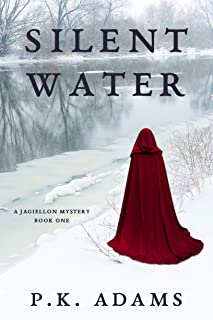5 Stars
Silent Water is an engrossing historical mystery that focuses on a series of murders that grips the royal court of Krakow, Poland, in the year 1519. The book’s first-person protagonist is Contessa Caterina Sanseverino, chief Lady-in-Waiting to Queen Bona Sforza of Italy, who two years earlier had married King Zygmunt of Poland and Lithuania. Caterina keeps watchful vigil over the young girls who serve as the queen’s attendants, but she—and the court around her—are roiled by the discovery of a stabbing victim during the Christmas Night banquet.
The murder at first appears random, but as Christmas turns into the New Year, a second murder occurs. Clues point to the inner circle of Queen Bona, who is controversial not only for the agricultural reforms she is implementing, but for her hawkish advice on how to wage war against the kingdom’s Teutonic and Crimean enemies. At Bona’s request, Caterina sets out to investigate. As her investigation takes her from the castle’s rat-infested dungeon to its kitchen storerooms, she is aided by Sebastian Konarski, a junior secretary to King Zygmunt.
I was particularly intrigued by the book’s setting in 16th-century Poland and how it contrasts the customs of the Polish court with those of the Duchy of Bari, Italy, where Caterina grew up. The book touches on so many fascinating themes, including the religious discord fostered by Martin Luther and his edicts. Also, the book illustrates the many limitations on women’s roles during this era in Poland, which makes Caterina’s bravery and willingness to transgress those limitations exciting. Caterina’s intelligence and inquisitiveness mirror the best qualities of the queen she serves and makes her a strong protagonist, one whom I would follow into the twisty depths of any medieval jail.
Fans of historical mysteries, particularly those of the Tudor period in England, will love Silent Water and appreciate its unique setting in the royal court in Krakow. I highly recommend Silent Water and am eager to read future books in the Jagiellon series.

